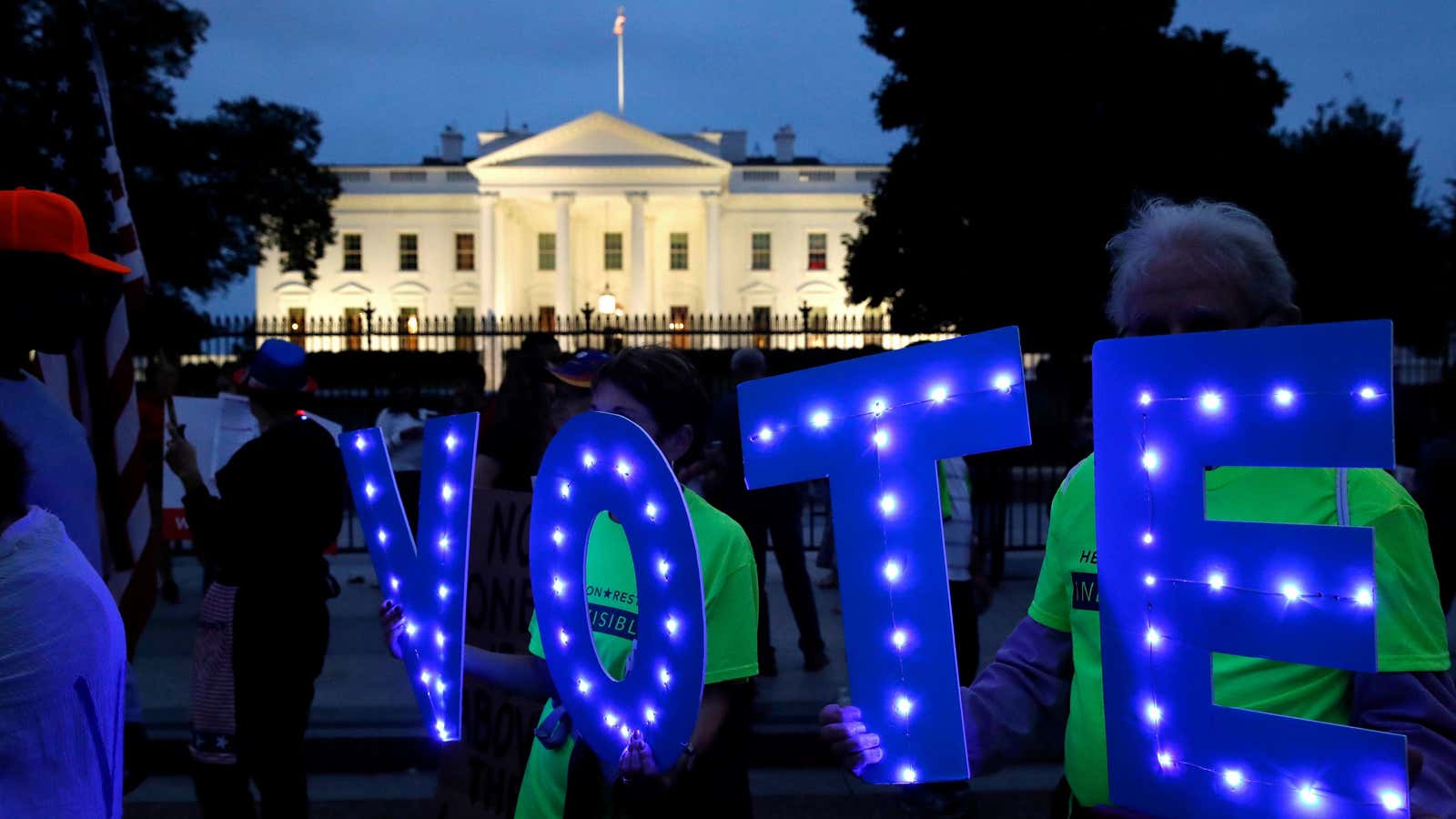Updated Mar. 19, 2020
The Democratic field for the 2020 presidential nomination remains crowded, although it is thinning quickly in 2020. Winnowing down the candidates may be tough for voters because most seem to be running on pretty similar platforms—promoting universal healthcare, pushing for regulations to curb climate change, reducing inequality, and improving conditions for the American middle class. And even as some candidates drop out, new candidates continue to join.
Here is a look at who is running, in alphabetical order, followed by those who had presidential aspirations but have dropped out of the race. Social media figures for each candidate are as of the day they announced their campaigns. You can also follow what these candidates are saying on Twitter using Quartz’s “DEMS 2020” list.
Who is officially running?
Joe Biden
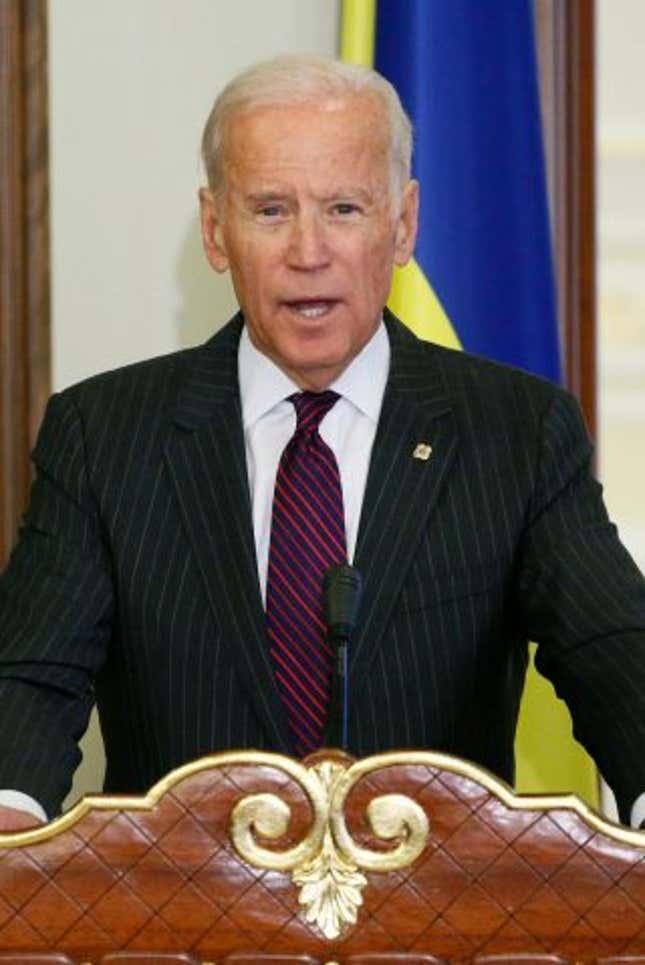
Biden, who entered the 2020 race officially with a campaign video April 25, already leads in the polls. Obama’s vice president and right-hand man, Biden has additional decades of federal experience as a senator from Delaware and a centrist appeal that could sway moderate Republicans and independents. Now leads Penn Biden Center for Diplomacy and Global Engagement at University of Pennsylvania.
Age: 76 Years in politics: 49
Who gives him money: Traditionally law firms, the insurance industry, and rich folk; Hollywood insiders recently gave $100,000 to his Democratic PAC.
Biggest idea for the economy: His Biden Institute is pushing tech education and increased bargaining power for American workers as a solution to the left-behind working and middle class.
Social media following: Twitter: 3.6 million, Facebook: 1.49 million, Instagram: 1.3 million.
Who will like this candidate: Democrats who think a safe pair of hands is a tested white man, independents nostalgic for the Obama administration, Republicans Trump has lost.
Who will hate this candidate: Progressive millennials eager for a new generation of leaders, far-right conservatives who hated Obama.
Bernie Sanders
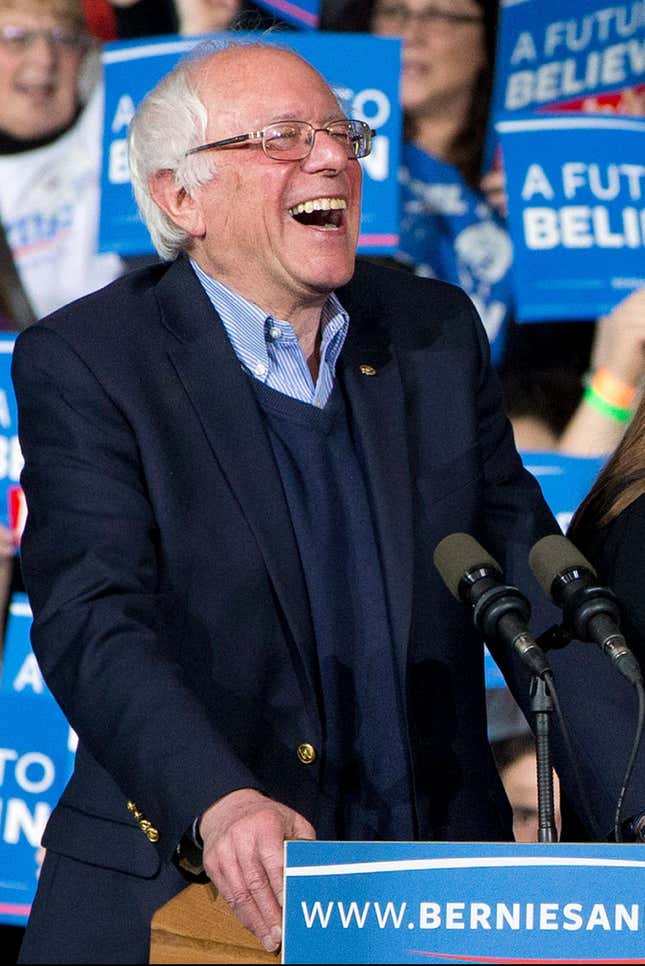
A Brooklyn-born self-described democratic socialist, Sanders was elected mayor of Burlington, Vermont in 1981 by a margin of just three votes. He was elected to the US House of Representatives in 1990, and the US Senate in 2006, where he remains today—the longest-serving independent senator in the history of the US. He challenged Hillary Clinton in the Democratic primaries in 2016 and entered the 2020 race on Feb. 19, promising “change from the bottom up.”
Age: 77 Years in politics: 38
Who gives him money: Over the past five years, 75% of Sanders’ campaign funds have come from small donors in amounts of less than $200, according to a Center for Responsive Politics analysis of FEC data. His top sources of funding include liberal advocacy group MoveOn.org, University of California employees, two postal-employee unions, and the Communication Workers of America. Just $177,000 of $12.7 million raised during that period came from PACs.
Biggest idea for the economy: Sanders would like to make public colleges tuition-free, increase Social Security benefits, and make corporate America more union-friendly. Sanders has proposed paying for the tuition costs by taxing financial transactions and the Social Security expansion by subjecting all incomes above $250,000 to the 6.2% payroll tax.
Social media following: Twitter: 8.1 million, Facebook: 7.5 million, Instagram: 2.9 million.
People who will like this candidate: Loyal “Bernie Bros” who still think he would have won in 2016, new converts to the idea of universal healthcare and higher taxes for the wealthy.
People who will hate this candidate: Democrats who see Sanders as a “spoiler” who siphons votes away from defeating Trump, Clinton fans still smarting over her loss, people of color alienated by Sanders’ last campaign.
Who was running, but dropped out?
Michael Bennet
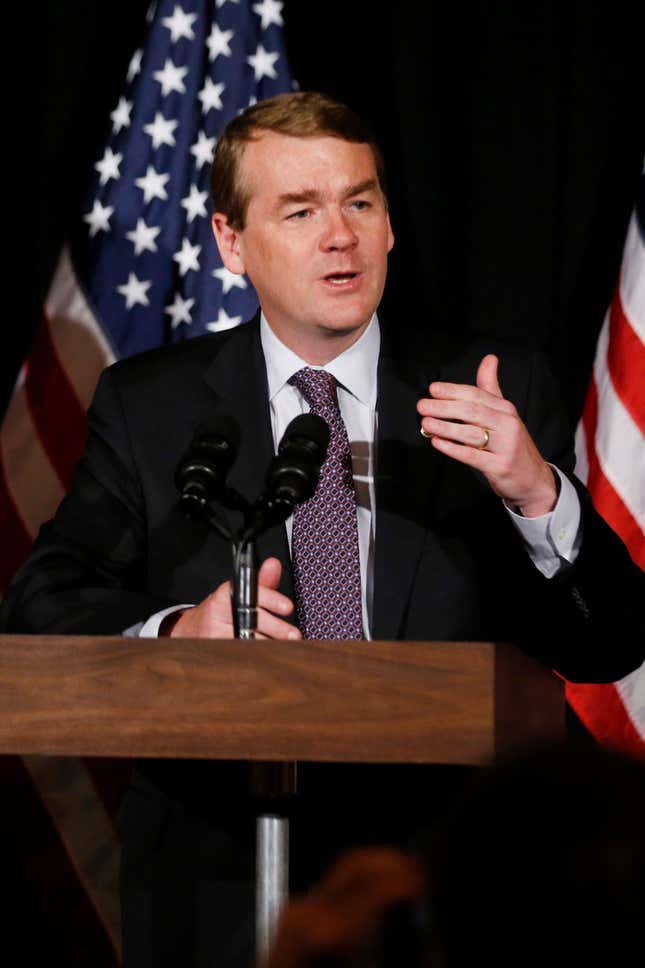
The Colorado senator announced May 2 on CBS This Morning that he was entering the race. Bennet may be best-known outside his state for his January 2019 excoriation of Ted Cruz in Congress, where he criticized the Texas Republican senator’s “crocodile tears” during the national government shutdown, noting that Cruz pushed a shutdown in 2013 when Colorado was “under water.” The two-term senator is credited with helping Democrats pass the Affordable Care Act, and has been speaking out against Trump’s attacks on the bill. Bennet dropped out of the race on Feb. 11, 2020.
On a recent trip to Iowa, he told voters that Americans “don’t have to settle” for being as “terrible” as Trump, or for the “tyrants” of the Freedom Caucus.
Age: 54 Years in politics: 10
Who gives him money: The finance and legal industry gave Bennet the most money in recent elections; he hasn’t indicated any 2020 strategy yet.
Biggest idea for the economy: Medicare X, which he calls a “true public option” for healthcare, that bridges the gap between Sanders’ “Medicare for all” plan (which he calls unrealistic) and private healthcare.
Social media following: Twitter: 288,700, Facebook: 104,000, Instagram: 7,780
Who will like this candidate: Voters who respond to pugnacious attacks on Trump and Republicans; those looking for a health care fix that satisfies many parties.
Who will hate this candidate: Anyone who thinks Democrats need a woman or a person of color in office this time; Bernie Sanders stans.
Michael Bloomberg
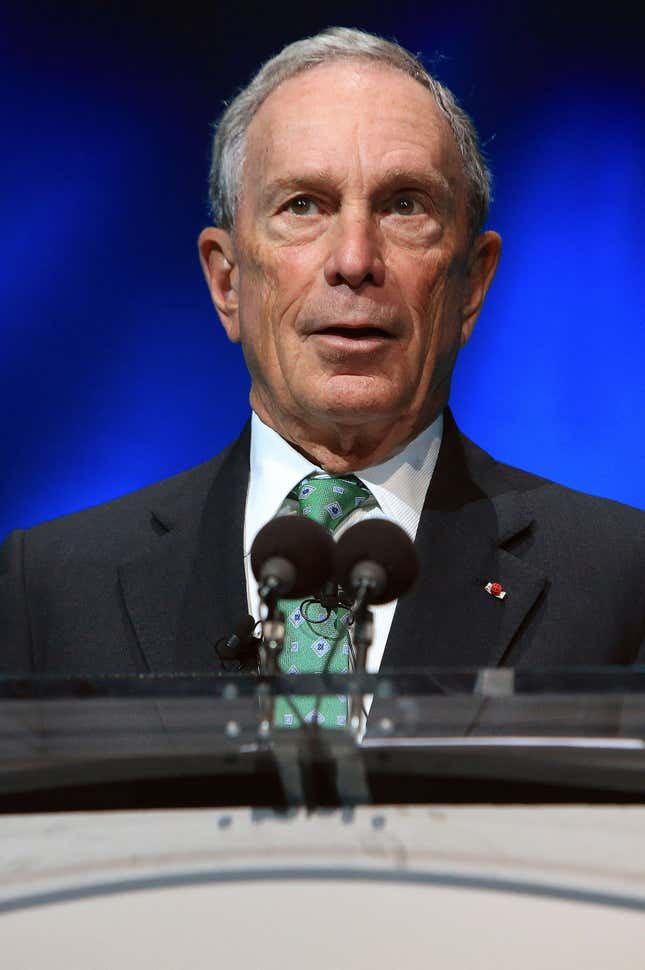
The billionaire, who made his money in Wall Street financial-services information, officially joined the race on Nov. 24, 2019, after officially denying he would run on Mar. 5, 2019. Bloomberg became New York City mayor in 2001, switching parties to run as a Republican. He controversially backed rewriting city laws to allow himself to run for a third term. He re-registered as a Democrat in October 2018. CEO of Bloomberg, he is a philanthropist and political donor, giving $100 million to Democratic midterm campaigns He also funds the gun-control nonprofit Everytown for Gun Safety. In a Bloomberg column (paywall) announcing his decision, he said he’d rather continue his work on those issues than campaign. Still, when he joined the race he did so with great enthusiasm—at least money-wise: His campaign didn’t pinch pennies to get the message out. But money, it seems, couldn’t buy him enough popularity amongst democratic voters, and Bloomberg quit the campaign on Mar. 4 after a poor Super Tuesday showing, endorsing Biden.
Age: 76 Years in politics: 18
Who gives him money: Nobody. He has funded his own campaigns and intends to take no money from political campaigns. He also says he will not take a salary were he to be elected president.
Biggest idea for the economy: Promises he can run the US government, the country’s largest employer, more efficiently than any recent president.
Social media following: Twitter: 2.3 million, Facebook: 756,400, Instagram: 202,000.
Who will like this candidate: Other centrists who think a steady hand means an older billionaire; gun-control supporters.
Who will hate this candidate: Anyone hungry to see a younger, less white, less male, non-billionaire be the face of the Democratic party.
Cory Booker
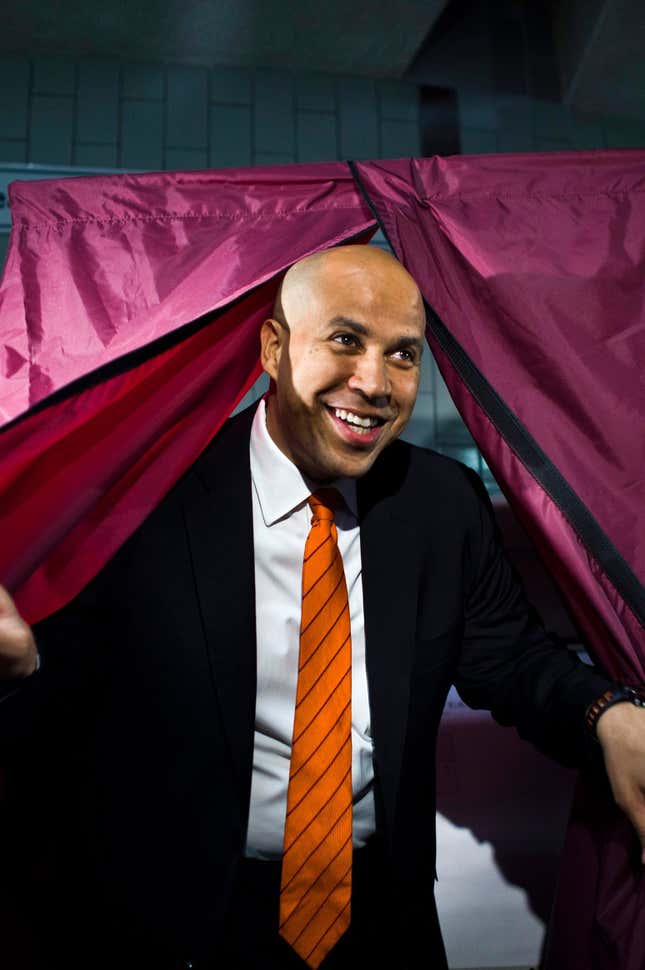
The former Newark, New Jersey mayor launched his campaign with an appeal to America’s common purpose and a focus on social and racial equality on Feb. 1, 2019. A Rhodes Scholar and Yale Law graduate who gained celebrity-politician status thanks to his early use of social media. The US senator from New Jersey has been criticized for being close to wealthy elites and for media-friendly stunts. Booker quit the race on Jan. 13. The senator said he didn’t see a path to victory and that his responsibilities in Washington due to the impeachment trial were keeping him from participating in the fundraising needed to scale up the campaign.
Age: 49 Years in politics: 17
Who gives him money: Mostly large individual contributors from the legal, investment and security, and real-estate sectors. A deep-pocketed Democratic donor set up a super PAC for Booker before he entered the race.
Biggest idea for the economy: A “baby bond” program that would give every child a US Treasury bond at birth, with a larger amount for poorer kids. He would also propose guaranteeing a $15 minimum-wage job in 15 test areas.
Social media following: Twitter: 4.18 million, Facebook: 1.27 million, Instagram: 635,000
Who will like this candidate: Voters looking for an optimistic message to contrast Trump’s negativity, northeastern city dwellers.
Who will hate this candidate: White rural voters who don’t want to focus on race and inequality, liberals concerned about his Wall Street and Silicon Valley enthusiasts.
Steve Bullock
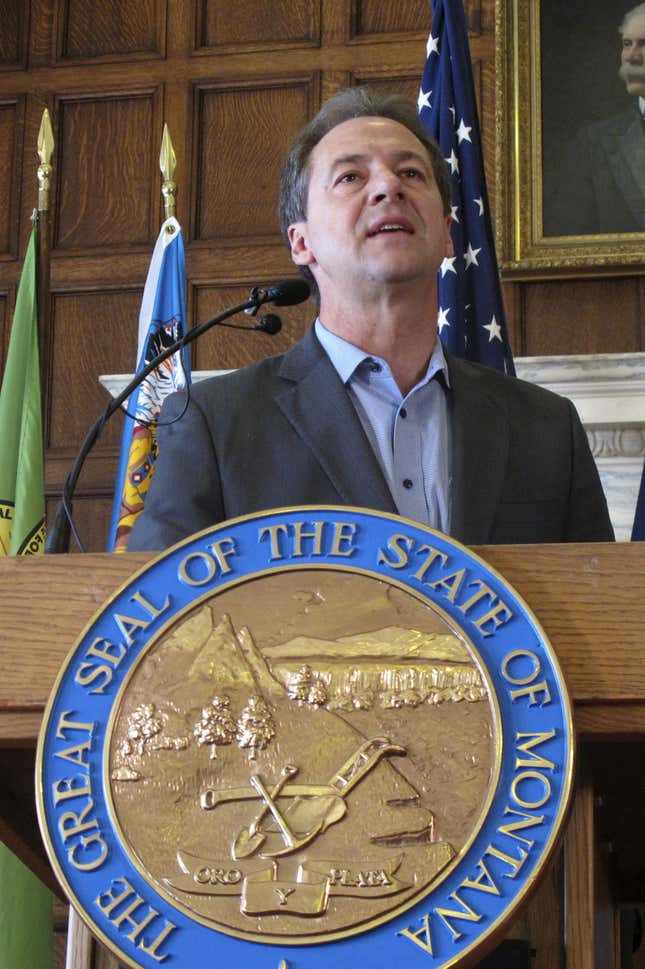
Montana’s governor and former state attorney general Steve Bullock made national headlines by fighting for strong campaign finance laws. A Democratic governor who was re-elected the same day that Trump won his state by a shocking 20% margin, Bullock is building his campaign on his ability to find common ground with conservative voters while implementing progressive policies.
Age: 53 Years in politics: 11
Who gives him money: The donations for his latest gubernatorial campaign came primarily from individuals; he had several unions amongst his supporters, most of which donated exactly $10,610 each.
Biggest idea for the economy: Reform campaign finance laws so that representatives don’t answer to donors, they answer to voters. Bullock pledges to force every company that wants government contracts to disclose every campaign donation, outlaw superPACs and overturn Citizens United.
Social media following: Twitter: 175,000, Facebook: 44,000, Instagram: 6,358.
Who will like this candidate: People who want to get rid of corporate money in campaign financing, workers’ unions, people looking for a sensible mainstream candidate.
Who will hate this candidate: People who have lost count of the number of white male Democratic candidates and are looking for a different kind of representation; the Koch brothers, who have built up a powerful behind-the-scenes campaign donor network
Pete Buttigieg
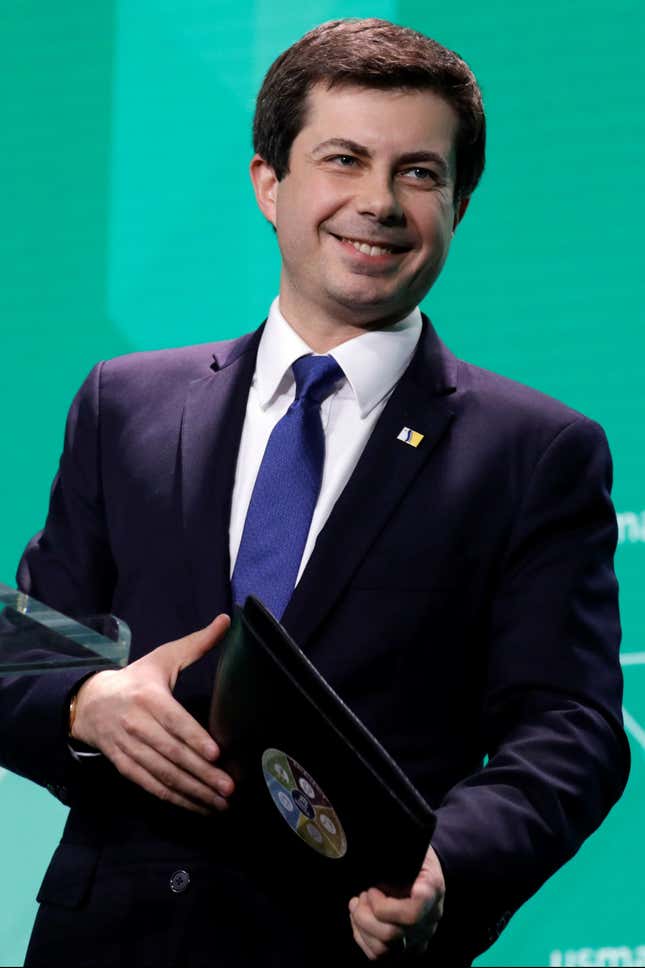
A gay Democratic mayor in South Bend, which is a conservative, Republican stronghold, Buttigieg presented a progressive message geared towards millennials in a Jan. 23 exploratory announcement, saying we “can’t look for greatness in the past.” An Afghanistan war veteran and former consultant, he was the city’s youngest mayor. His LGBTQ, Harvard- and Oxford-educated profile may appeal to coastal elites and his midwest roots may give him an advantage in the rest of the country. Buttigieg formally announced his candidacy April 14. Buttigieg had an impressive run, placing first in the Iowa primaries and second in New Hampshire, but lost momentum after and eventually decided to drop out of the race on Mar. 1, 2020, the day after the South Carolina primaries.
Age: 37 Years in politics: 17
Who gives him money: Local businesses and CEOs supported his mayoral campaign. He created a PAC for megadonors to support Democrats in 2017 that may be used to fund his 2020 run.
Biggest idea for the economy: Increase public protections of jobs and benefits to help make the employment market more dynamic without the fear of personal debt tied to college loans and medical bills.
Social media following: Twitter: 1.2 million, Facebook: 377,800, Instagram: 67,600.
Who will like this candidate: Millennials, LGBTQ voters, voters from flyover states, social progressives.
Who will hate this candidate: Voters looking for a more experienced candidate, conservative Christians.
Julián Castro
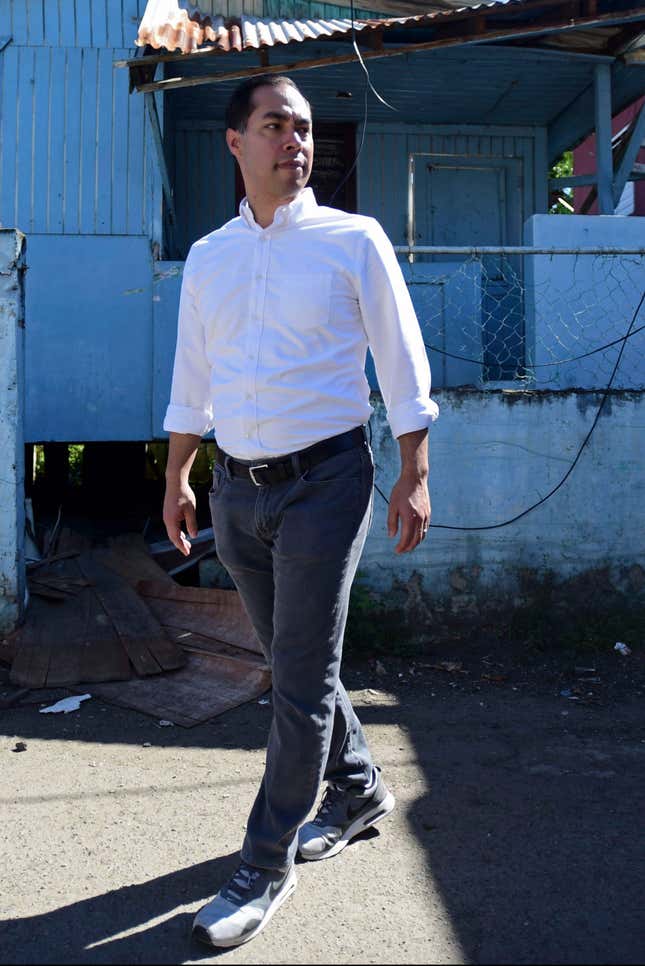
After growing up in a poor San Antonio neighborhood, Castro—and twin brother Joaquín—went on to earn Ivy League degrees and take on careers in national politics. Onetime mayor of San Antonio, Castro was US secretary of housing and urban development under Barack Obama. That experience, along with his mother’s activism with Latino groups, is a central part of the narrative he’s pitching to voters. He entered the race on Jan. 12, 2019, and dropped out on Jan. 2, 2020, explaining in a final campaign video that “it simply isn’t our time.”
Age: 44 Years in politics: 18
Who gives him money: He’s pledged not to take “a dime” from political action committees. There are no public records about who contributed to his runs for mayor, because San Antonio is only required to keep campaign-finance documents for two years. The PAC he created to support new Democratic candidates in the 2018 election, Opportunity First, has vowed not to take donations from corporate PACs.
Biggest idea for the economy: Though he hasn’t released many details of his platform, he’s been a strong advocate of free trade, which has benefitted his hometown. He’s defended free trade deals, arguing that instead of scrapping them, they should be reworked to strengthen protections for workers and the environment. (His campaign did not immediately respond to a request for comment.)
Social media following: Twitter: 179,000, Facebook: 102,400, Instagram: 24,400
Who will like this candidate: Democrats looking for a fresh face, Latino voters, free traders.
Who will hate this candidate: Democrats dismissive of identity politics, opponents of affirmative action (which Castro supports).
Bill de Blasio
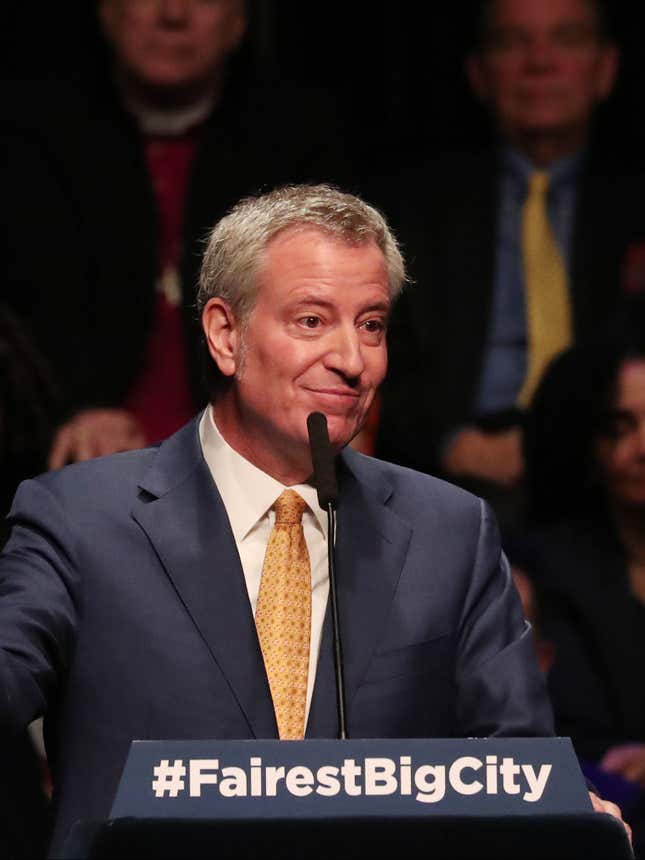
The New York City mayor announced his entrance to the ring on May 15 on Good Morning America, before traveling to Iowa and South Carolina to campaign, according to multiple reports. He officially dropped out of the race on Sept. 20. De Blasio is steeped in local politics, having served as the city’s public advocate and on Hillary Clinton’s winning Senate campaign, but his time as mayor has been rocky. Still, he’s expected to emphasize his achievements there to progressive voters, including $15 minimum wage, universal pre-Kindergarten, and a drop in crime.
Age: 58 Years in politics: 12
Who gives him money: Donors for his mayoral campaign included workers’ unions and Democratic PACs.
Biggest idea for the economy: As mayor, de Blasio has presided over healthy economic expansion, but struggled to fix growing inequality. He’s expected to focus on progressive ideas to close that gap nationwide, including nationalizing his universal successful pre-Kindergarten program and increasing affordable housing.
Social media following: Twitter: 157,600, Facebook: 263,700, Instagram: 58,500
Who will like this candidate: His pre-K push, which essentially provided educational childcare for the city’s four-year-olds, was a big hit with parents.
Who will hate this candidate: Given list of New York politicians who they’d choose for president, even New Yorkers didn’t go for de Blasio. Flip-flopping on major initiatives like the Amazon headquarters (he embraced anti-Amazon activists at the last minute) and failing to push for legalization of marijuana until this past December has turned off city residents. His progressive ideas could prove even less popular in red states.
John Delaney
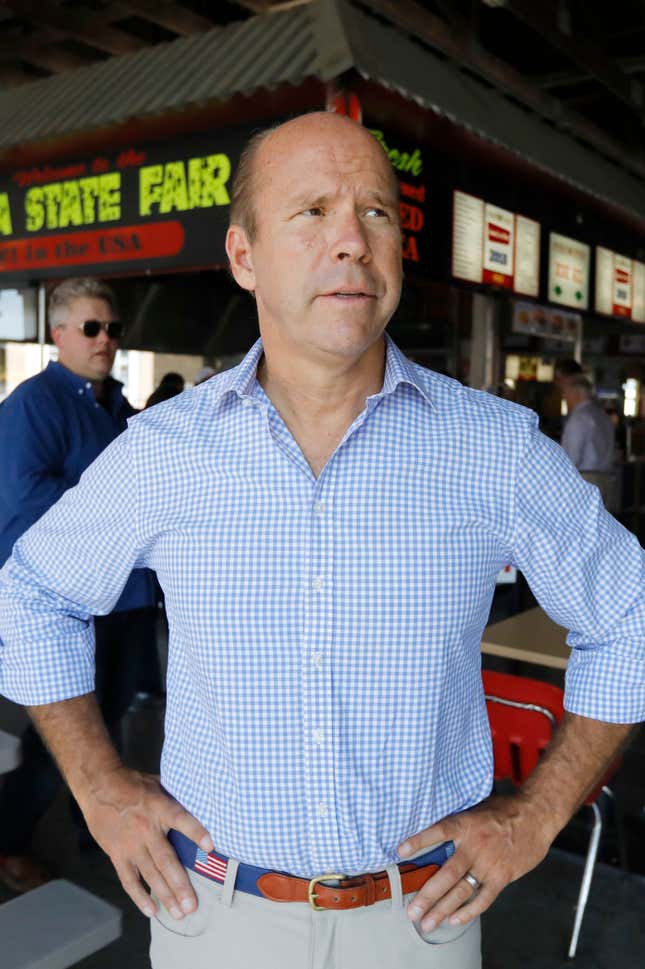
In order to qualify for the televised debate on Oct. 15, candidates had to receive at least 2% of the preference in four different national polls by approved pollsters. They also needed to have at least 130,000 donors in total, or at least 400 different donors in 20 states. Although only 12 of the candidates met these criteria, several others remain in the race:
The former congressman from Maryland started two publicly listed lending companies before running for office in 2012. The first generation in his family to go to college (he stresses his electrician father’s union membership on the campaign trail), he was the very first Democrat to announce he was running way back in July 2017. Delaney ended his race on Jan. 31, 2020.
Age: 55 Years in politics: 6
Who gives him money: Funded by banks, housing, and construction companies in his congressional race. Independently wealthy, funding himself now.
Biggest idea for the economy: Build a public and private international coalition against China’s intellectual property theft, and compete against China in Asia with a TPP-style trade deal.
Social media following: Twitter: 14,400, Facebook: 357,000, Instagram: 2,100.
Who will like this candidate: Centrists drawn by his nuts-and-bolts pitch to improve workers’ rights, education, and infrastructure.
Who will hate this candidate: Democrats who don’t think that reaching out to Donald Trump voters is the way to win in 2020.
Tulsi Gabbard
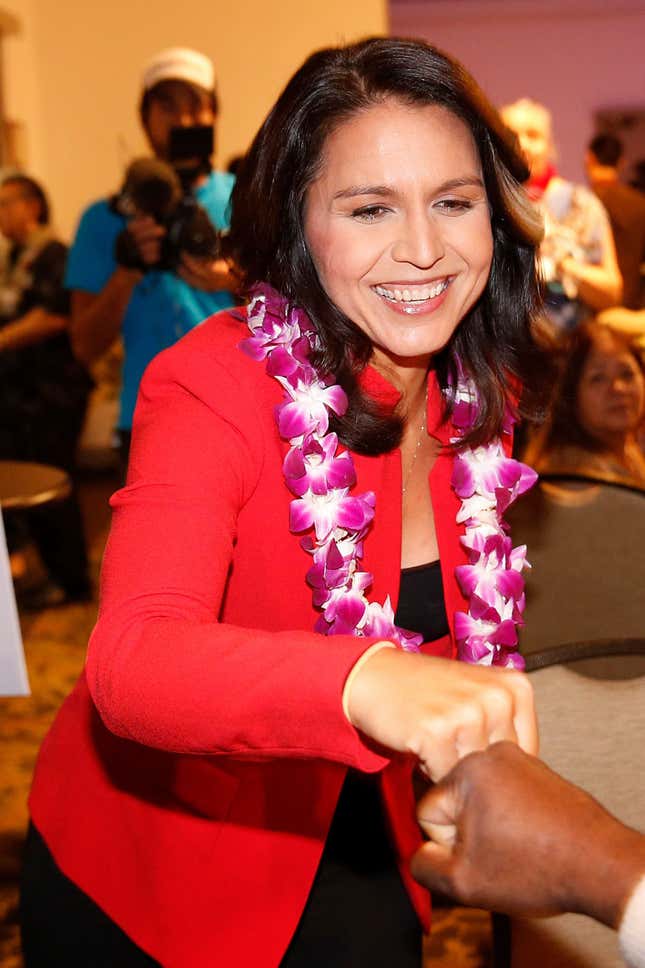
The first Hindu member of Congress, the Hawaii representative controversially met with Syrian leader Bashar al-Assad and sided with Russian president Vladimir Putin against Obama on US intervention in Syria. Strongly opposed to regime-change wars after her experience fighting in the Iraq war as part of the National Guard, she speaks about fighting “radical Islam.” A onetime Hawaii state representative, she supported Bernie Sanders’ 2016 Democratic primary campaign. On Feb. 2 she entered the race she calls a “fight for the soul” of America. Gabbard, who won two delegates, officially dropped out on Mar. 19 endorsing Joe Biden.
Age: 37 Years in politics: 17
Who gives her money: Health professionals, real-estate interest groups. Most donors are individuals, though her second-largest contribution ($36,400) between 2011 and 2018 came from the National Automobile Dealers Association’s PAC.
Biggest idea for the economy: Cut taxes on small businesses and farmers, raise them on corporations; lower military spending by ending regime-change wars and reducing the acquisition of nuclear weapons.
Social media following: Twitter: 279,000, Facebook: 300,600, Instagram: 74,300
Who will like this candidate: Veterans, some progressives, voters looking to reduce military spending.
Who will hate this candidate: People who are concerned about Islamophobia, supporters of global trade.
Kirsten Gillibrand
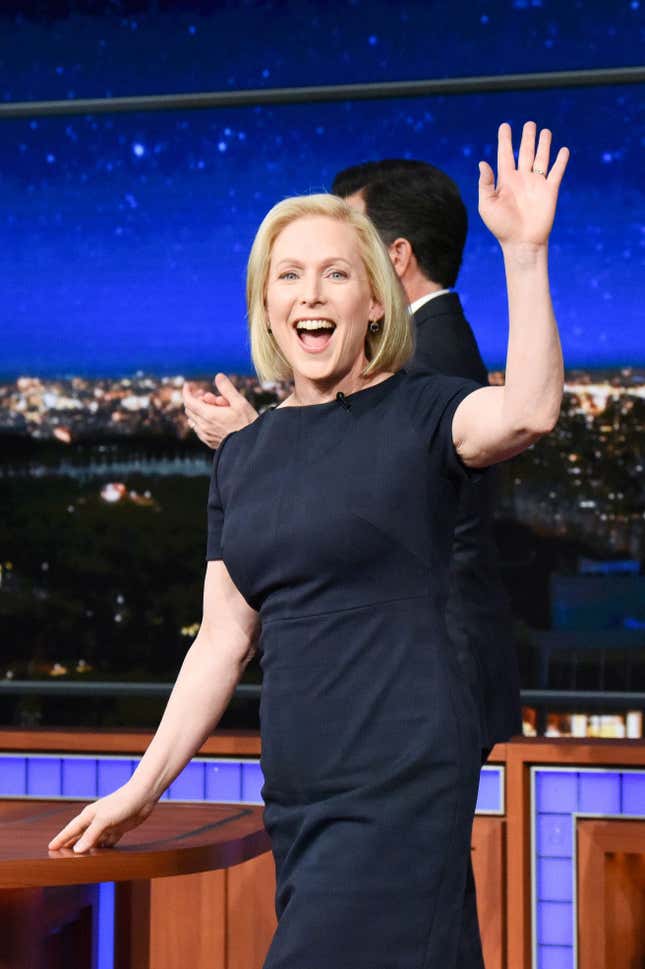
The former corporate lawyer and New York congressional representative became known as the “Me Too senator” after calling out Trump’s sexism and leading the push for Democratic senator Al Franken to resign after sexual-misconduct allegations. Gillibrand announced she was exploring a run Jan. 16 on Stephen Colbert’s CBS late-night show, stressing assistance for public schools, job training, and support for the middle class. She officially entered the race with a campaign video March 17. Gillibrand dropped out of the race on Aug. 28, having failed to qualify for the televised debates.
Age: 52 Years in politics: 11
Who gives her money: Law firms, Wall Street institutions.
Biggest idea for the economy: Gillibrand has been pushing the US to require that companies adopt a universal paid parental leave policy.
Social media following: Twitter: 1.4 million, Facebook: 550,400, Instagram: 233,000.
Who will like this candidate: Establishment-oriented voters and party supporters closely tied to the Democratic National Committee, where Gillibrand has deep support, and still-with-Hillary folks.
Who will hate this candidate: Progressive voters—Gillibrand’s work defending the tobacco industry and her anti-immigrant platform a decade ago raise questions about where her loyalties lie.
Mike Gravel
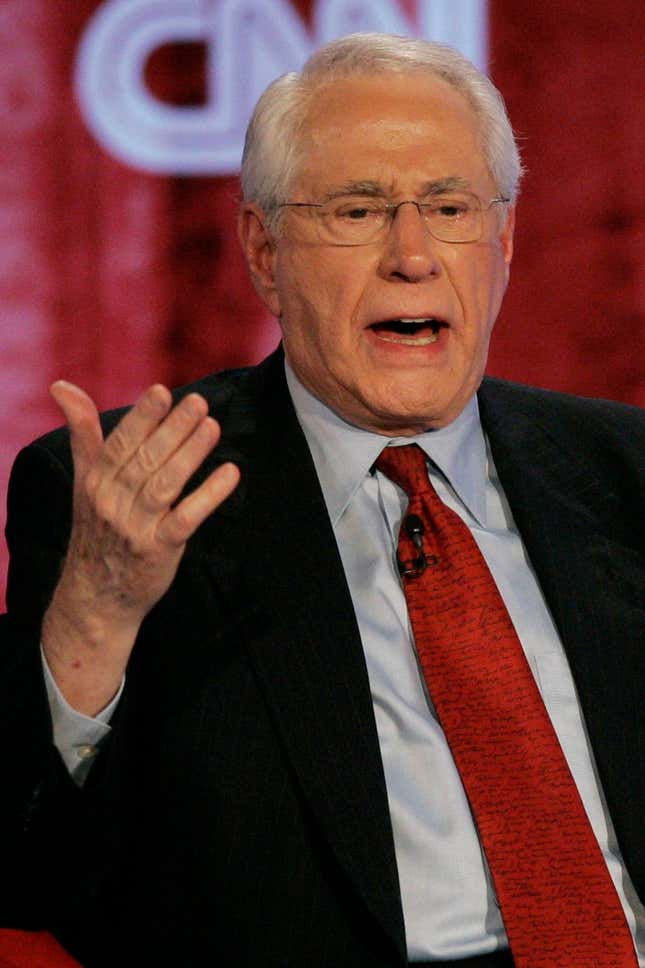
The former US senator from Alaska, a one-time pot industry executive, and anti-war activist jumped into the race on April 8, and dropped out on Aug. 28. The campaign marks his return to national politics following a more than a decade-long hiatus after running in the 2008 Democratic presidential primaries. (Before then, he hadn’t held public office since 1980, when he lost his Senate seat.) The octagenarian says his current bid is not to win, but to challenge centrist Democrats’ views on the economy, the environment, and US foreign policy during the presidential debates. “It’s time to make some waves for change,” he says in a YouTube video, a remake of his 2008 campaign viral hit. It’s unclear whether his team, made up of a group of teenagers, can amass the 65,000 donations needed to earn Gravel a spot. So far they’re at a little over 14,000.
Age: 88 Years in politics: 56 (on and off)
Who gives him money: Individuals provided the bulk of the contributions during the 2008 primaries, with an insignificant fraction coming from PACs. (He’s said he will donate all the money he has left over from this cycle towards efforts to get Flint, Michigan clean water.)
Biggest idea for the economy: Creating a social wealth fund to distribute taxes from financial transactions and IPOs through a yearly dividend to all American adults.
Social media following: Twitter: 99,700, Facebook: 15,700, Instagram: 17,800.
Who will like this candidate: Democrats pushing for anti-establishment agenda, Americans who want the US to get out of foreign conflicts.
Who will hate this candidate: Democrats who want the party to head into the general election united, voters focused on bread-and-butter domestic issues.
John Hickenlooper
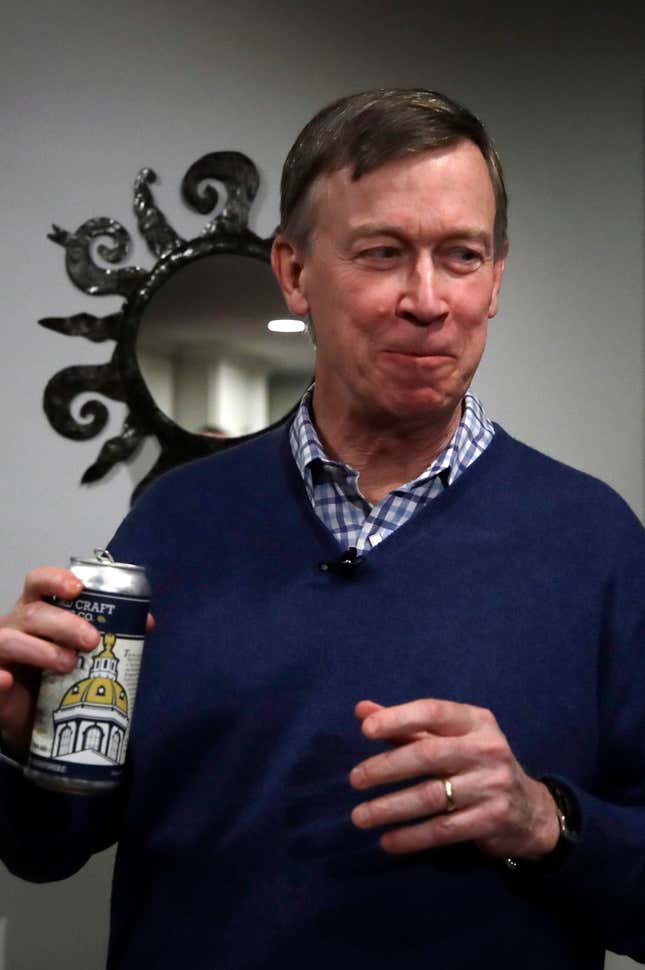
A geologist and businessman, John Hickenlooper served two terms as Denver mayor before being elected Colorado governor in 2010. His campaign announcement, delivered via video on March 4, highlights his personal successes—he reinvented himself by starting a brewery after being laid-off. He also touts his experience of running rapidly growing Colorado, including by shepherding its economy and enforcing gun-control laws in the state. A moderate with bipartisan appeal, he pitches himself as the right person to take on Donald Trump, whose presidency he calls “a crisis that threatens everything we stand for” in his video. Hickenlooper dropped out of the presidential race in mid-August and on Aug. 22 announced that he will run for the Senate in Colorado.
Age: 67 Years in politics: 16
Who gives him money: Government workers, lawyers and lobbyists, and real-estate firms funded his gubernatorial races. He also received contributions from energy and telecom companies.
Biggest idea for the economy: Cutting red tape to reduce the cost of doing business and increase compliance with regulations.
Social media following: Twitter: 146,000, Facebook: 114,000, Instagram: 13,400.
Who will like this candidate: Centrists, Democrats who believe in bipartisanship, never-Trump Republicans.
Who will hate this candidate: Progressive Democrats.
Kamala Harris
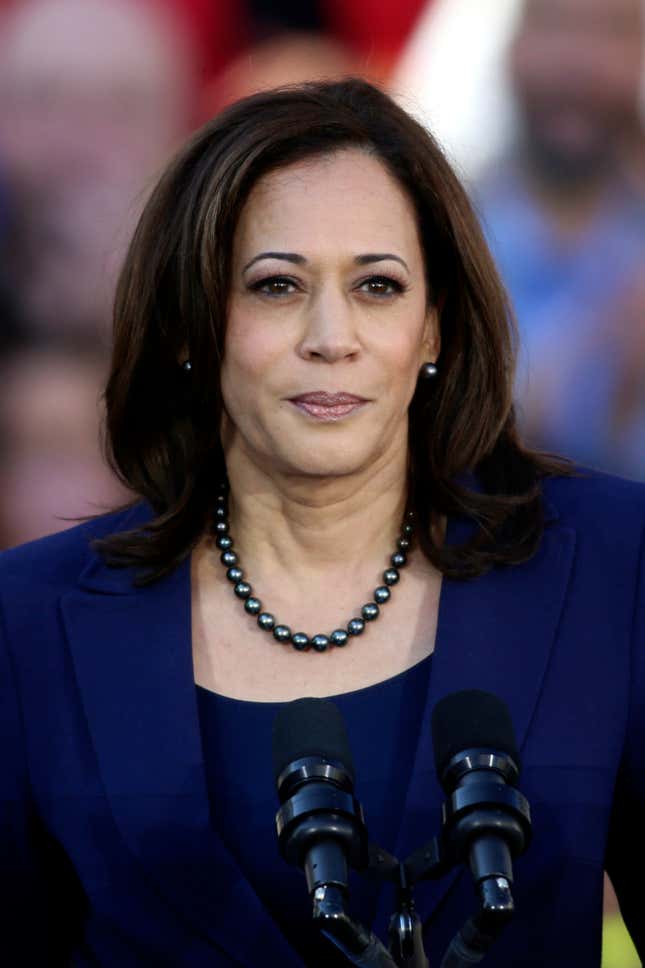
The child of Jamaican and Indian immigrants, Harris became a prosecutor in Oakland, California, the San Francisco district attorney, and finally California’s attorney general before winning her US Senate seat in California. She stepped into the race Jan. 21 on a morning talk show. On Dec. 3, Harris withdrew from the race, lacking the funds to continue her campaign.
Age: 54 Years in politics: 16 years
Who gives her money: In the past five years, 35% of Harris’ campaign funds have come from small donors, according to a Center for Responsive Politics analysis of Federal Election Commission data. Her top sources of funding include attorneys, retirees, financiers, and the entertainment industry. Her biggest contributors by employer were WarnerMedia, the University of California, Google-parent Alphabet, Inc., 21st Century Fox and the law firm Venable. Her presidential campaign won’t accept donations from corporate PACs.
Biggest idea for the economy: The LIFT Act, a working- and middle-class tax cut akin to the Earned Income Tax Credit that she says will provide up to $500 a month to families. To pay for it, she wants to reverse Trump’s 2017 tax cuts for corporations and the wealthy—but it’s not clear if she’ll tackle the radical structural changes that bill made in how US multinationals operate.
Social media following: Twitter: 2.37 million, Facebook: 1.22 million, Instagram: 1.5 million.
People who will like this candidate: Fans of Obama’s progressive pragmatism looking for a candidate who can combine a compelling personal biography with the promise to unite the party’s multi-ethnic coalition.
People who will hate this candidate: Progressives who thought Obama was a sellout, particularly those who question her mixed record on reforming the justice system.
Jay Inslee
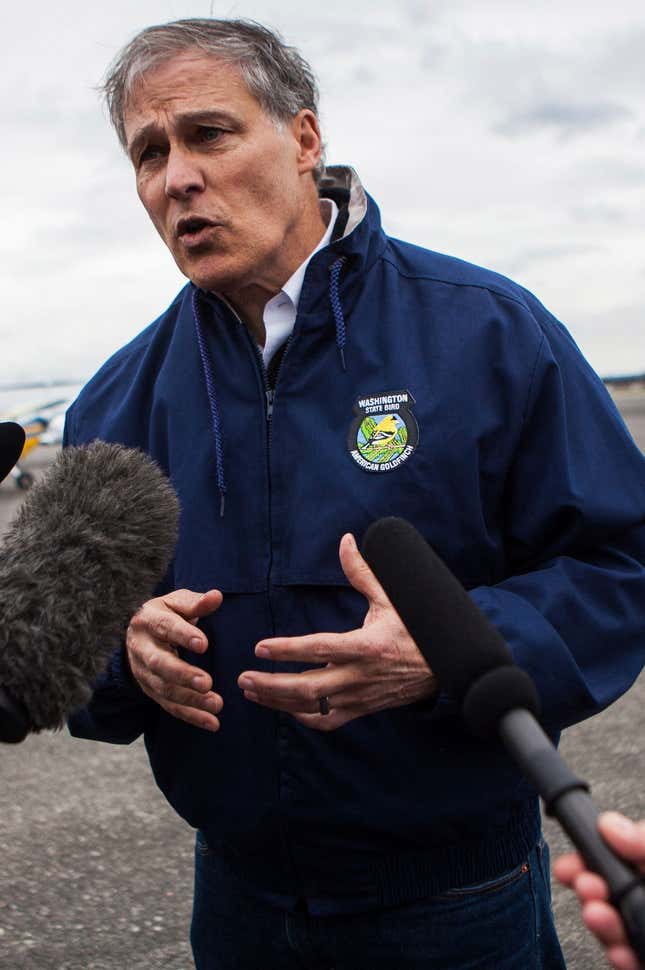
The Washington state governor and veteran Congress member threw his hat in the ring on March 1, on a platform of environmental protection and stopping climate change. He dropped out of the race on Aug. 21.
“This is our moment,” Inslee and a host of supporters, including Bill Nye, the “science guy” declare in his introductory video. As governor, Inslee is pushing privacy regulations for the tech industry, and new technology in the maritime industry to make it more efficient.
Age: 68 Years in politics: 24
Who gives him money: A new super-PAC, Act Now on Climate, was formed in February to support Inslee’s run. It won’t accept corporate donations, and Inslee’s campaign says it will shun money from the fossil-fuel industry. In the past, he’s been funded by the electronics and tech industry and affiliated unions, particularly Microsoft, which is headquartered in his state.
Biggest idea for the economy: Stopping climate change can boost economic growth, and create millions of new jobs as the US transitions to “100% clean energy and net-zero greenhouse gas pollution,” Inslee says. He proposes removing subsidies and tax breaks for the fossil-fuel industry, and supports the Green New Deal.
Social media following: Twitter: 168,000, Facebook: 135,000 (personal page) and 110,000 (governor page), Instagram: 9,200.
People who will like this candidate: Inslee’s long history of sounding the alarm on climate change will endear him to anyone worried about looming environmental disaster; his tech-focused solutions for the country’s woes are likely to appeal to that industry.
People who will hate this candidate: Climate science deniers, fossil-fuel industry executives, wealthier individuals opposed to his capital gains tax proposals in Washington state.
Amy Klobuchar

The former corporate lawyer, who was the first woman to be elected a Minnesota senator, has established a reputation as a matter-of-fact centrist, tackling kitchen-table issues like drug pricing. Her unflappable questioning of Supreme Court nominee Brett Kavanaugh earned her kudos from farther-left Democrats. She held an outdoor rally in a blizzard on Feb. 10 to announce she was running, aiming to highlight her “grit” and the “friends and neighbors” who showed up to cheer. Klobuchar dropped out of the race on Mar. 2, ahead of Super Tuesday, and reportedly plans to endorse Joe Biden.
Age: 58 Years in politics: 12
Who gives her money: Traditionally law firms and the food and dairy industry. Klobuchar is pledging to get “dark money” out of politics, and said she won’t take corporate PAC money for the 2020 race.
Biggest idea for the economy: New measures to make it easier for small and mid-sized US businesses to export goods worldwide.
Social media following: Twitter: 631,000, Facebook: 319,700, Instagram: 51,900.
Who will like this candidate: Folks looking for a Goldilocks candidate—neither too left nor too right, and a woman who appeals to midwestern voters.
Who will hate this candidate: Democrats to her left may be opposed to Klobuchar’s centrist appeal.
Wayne Messam
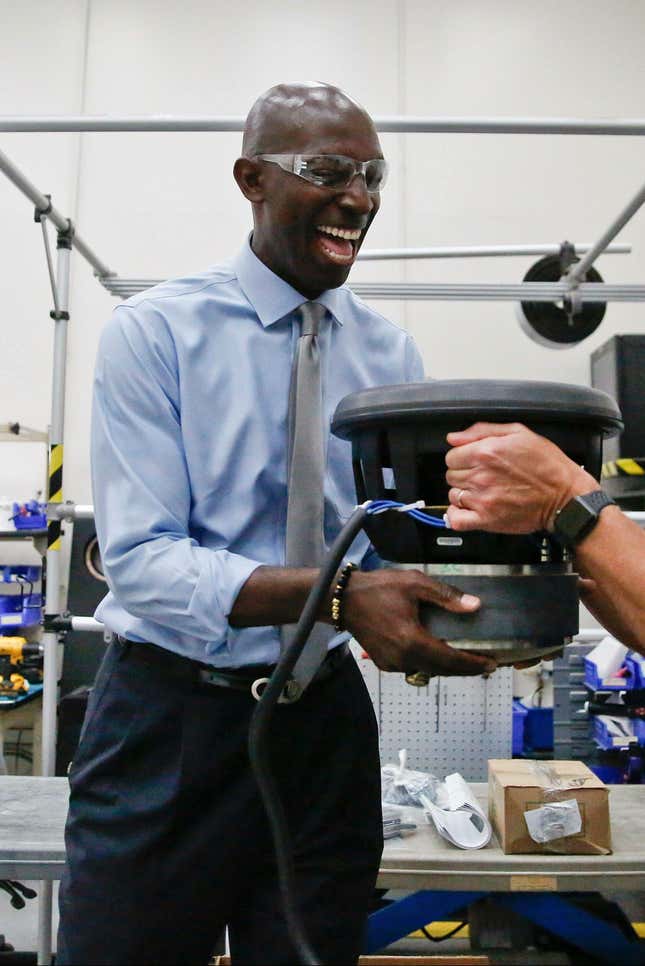
The mayor of Miramar, Florida and a construction company owner, Messam launched an exploratory committee on March 12, and said March 28 he was running on a platform of curbing gun violence, fighting climate changes, and “restoring the promise of America. “I do not believe that the best ideas come from Washington,” he said in his campaign website. He dropped out of the race in November, 2019.
The son of Jamaican immigrant, a former NFL football player, and the first African-American mayor of Miramar, Messam says in his campaign intro “the ‘American Dream’ is real for me…we need to bring that back for every American.” Miramar, population 150,000, could provide lessons for the rest of the country, Messam believes, including attracting high-paying jobs and fighting climate change denialism.
Age: 44 Years in politics: 8
Who gives him money: Messam is expected to rely heavily on small donors, and kicked off his campaign asking for $3 contributions. His latest mayoral campaign took in just over $80,000, half of which was from contributors who gave from $20 to $1,000. He personally contributed the remaining half through a loan.
Biggest idea for the economy: Messam proposes cancelling the US’s $1.5 trillion in student debt, calling it a “moral issue,” and a hurdle that prevents economic mobility in the country. He would also rescind Trump’s tax cut on corporations and the wealthy.
Social media following: Twitter: 7,500 Facebook: 4,800 Instagram: 5,100
Who will like this candidate: Floridians, anyone looking for more heft for the party’s support of gun control and climate science; those who think small town solutions can apply countrywide.
Who will hate this candidate: Skeptics who think a president should have experience as a Congress member or governor first; the “Democrats are going too far to the left” crowd.
Seth Moulton
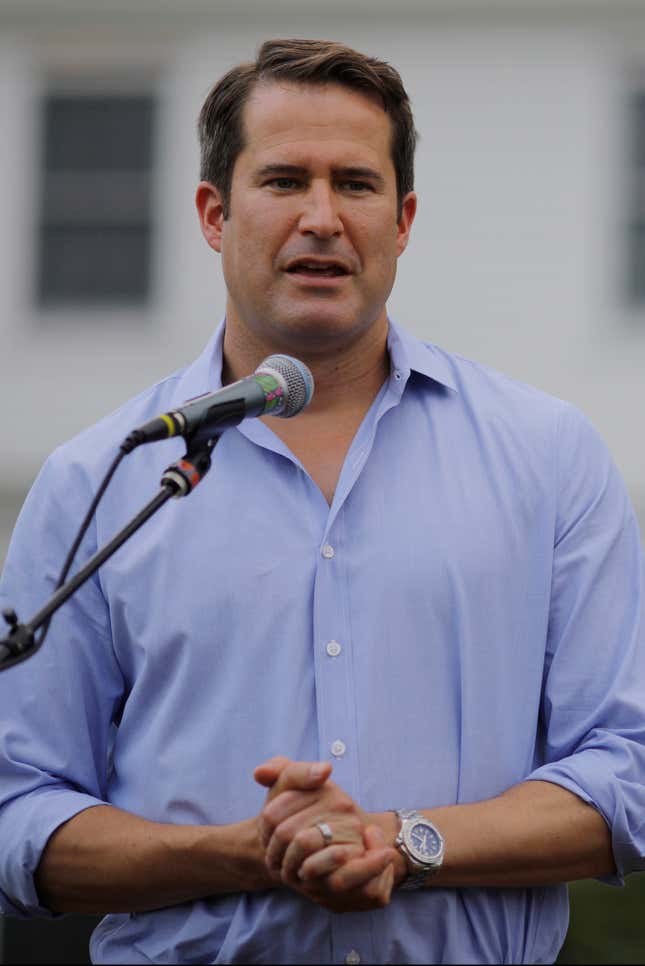
The congressman from Massachusetts and former Marine launched his campaign for president on April 22, with a pledge to wrestle the idea of patriotism back from Republicans, cut weapons programs the US doesn’t need, stop Russian cyber-hacking and restore America’s moral authority. “The greatest generation saved our country from tyranny, it’s time for our generation to step up and do the same,” Moulton said in a video, explaining that he’s running because “we have to beat Donald Trump.” He dropped out of the race on Aug. 23.
Moulton, who led a failed attempt to oust Nancy Pelosi as speaker of the House, has supported veterans issues and gun-safety legislation since joining Congress in 2015.
Age: 40 Years in politics: 5
Who gives him money: Moulton has raised money from a diverse pool of donors in the past that included Harvard University (he’s a Harvard grad) and weapons-maker Northrop Grumman. Unlike many of his Democratic competitors, Moulton hasn’t pledged not to take corporate PAC money ahead of the primaries.
Biggest idea for the economy: Moulton is backing the Green New Deal as a genesis of new “green jobs” in America.
Social media following: Twitter: 143,100, Facebook: 179,000, Instagram: 8,150
Who will like this candidate: Voters looking for a supporter of progressive issues including gun safety and climate change in a conservative-looking package.
Who will hate this candidate: Pelosi fans, Democrats who have stressed that party unity is the best way to beat Trump.
Beto O’Rourke
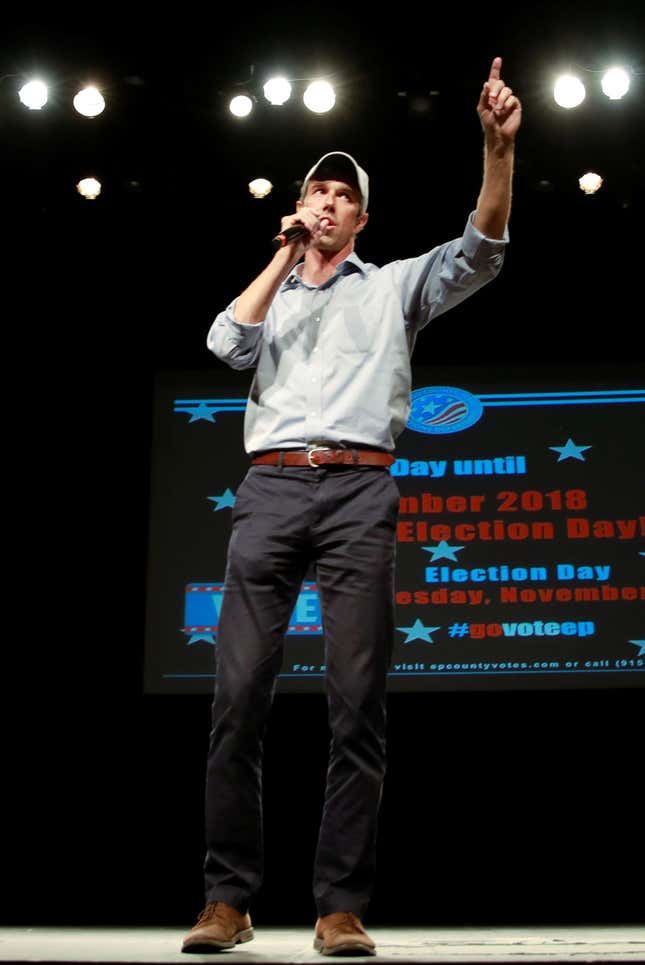
Virtually unknown outside Texas until last year, O’Rourke now has a national fan base thanks to his plucky campaign against US senator Ted Cruz. After months of speculation, the former US representative and El Paso, Texas city councilman, tech-company founder, and onetime punk rocker announced his presidential bid in a March 14 video. His upbeat message and multicultural background—he grew up on the border with Mexico—played well with Trump-fatigued voters, but he’s short on experience and policy proposals.
Age: 46 Years in politics: 14
Who gives him money: His race against Cruz was mainly funded by individual contributors but he took PAC money in previous elections.
Biggest idea for the economy: His economic proposals during his Senate run last year were focused on reducing inequality, though they were rather vague. They included stronger anti-trust regulations to break up monopolies and encouraging companies to invest profits in their employees and communities.
Social media following: Twitter: 1.4 million, Facebook: 939,000, Instagram: 947,000.
Who will like this candidate: Democrats disillusioned with party leadership (especially millennials), immigrants, veterans.
Who will hate this candidate: Voters hungry for nitty-gritty details on what his policies would be, Democrats who want the party to stay away from divisive, culture-war issues.
Deval Patrick
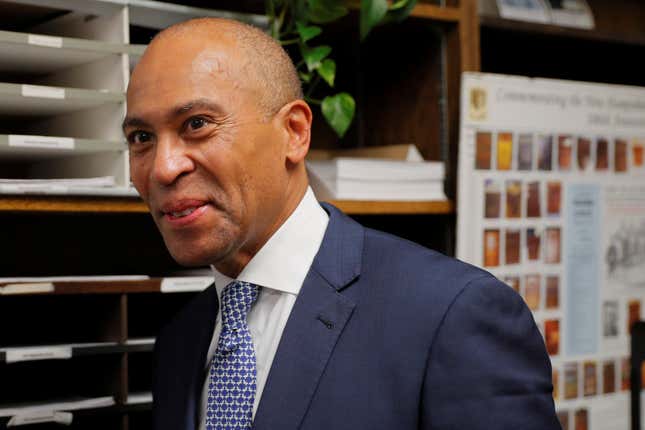
Just days before the deadline to sign up for the New Hampshire primary, former two-time Massachusetts governor Deval Patrick threw his hat in the ring. He missed the deadlines to qualify for the Arkansas and Alabama primaries. His announcement video featured him tieless in a button-down shirt, a la Andrew Yang and Beto O’Rourke, discussing his difficult upbringing in a tenement in Chicago’s south side. He dropped out of the race on Feb. 12 after a poor showing in the primary.
Patrick, an investment banker who works for Bain Capital on funding “mission-driven companies that target both social and environmental good,” said he was running because he was able to achieve the American dream. He was the first in his family to go to college and law school. But, he says, the dream is becoming ever more distant for more Americans and he wants to change that.
Age: 63 Years in politics: 11
Who gives him money: A few wealthy donors, including Joshua Boger, founder of Boston-based Vertex Pharmaceuticals.
Biggest idea for the economy: So far, Deval appears not to have articulated a specific plan for the economy but a general vision about an “Opportunity Agenda” that offers education, sparks innovation, and rebuilds infrastructure.
Social media following: Twitter: 45,700 Facebook: 51,750 Instagram: 460
Who will like this candidate: People who believe in the middle ground and private-public endeavors.
Who will hate this candidate: Progressives looking for radical new policies and a change to the status quo.
___________________________________________________________________________________________________________________________________________
Tim Ryan
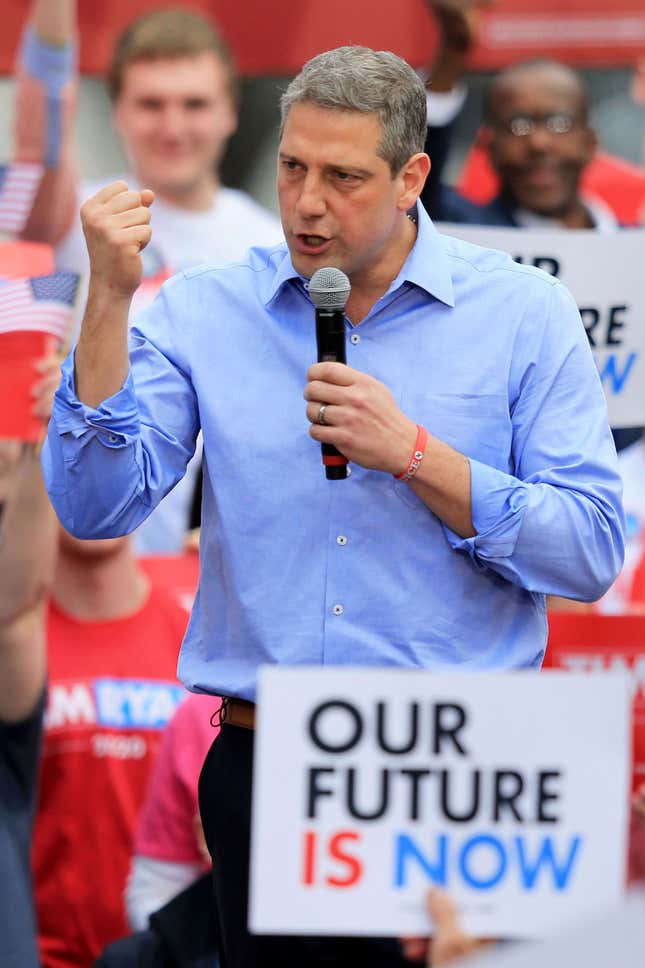
During his eight terms in Congress, Ryan, a native Ohioan, has been a vocal backer of union labor, renewable energy, and single-payer healthcare. He wants to revitalize American manufacturing, public education, and support struggling US veterans. Ryan believes he is the best chance Democrats’ have of winning back white, working-class voters who voted for Trump in 2016. “Flyover states are my states,” he said as he kicked off his campaign April 4.
Age: 45 Years in politics: 15
Back story: Ryan was first elected to the House of Representatives in 2002. After college, he worked for late Ohio congressman James Traficant, who left office when convicted on corruption charges. Ryan is a devotee of meditation and mindfulness, and wrote a book about it, A Mindful Nation, in 2012.
Who gives him money: About 38% of Ryan’s donations over his House career have come from labor unions; lawyers and law firms have historically been his biggest supporters. Ryan relies mostly on large single donations, as 92% of all contributions to his campaign during the 2018 cycle were amounts above $200.
Biggest idea for the economy: Ryan has talked about creating jobs in electric-vehicle manufacturing and other green industries. He is pro-business and pro-fracking, and cautions against Democrats moving too far to the left. “We can’t green the economy without the power of the free-market system,” he said.
Social media following: Twitter: 72,000, Facebook: 59,000, Instagram: 3,500
Who will like this candidate: Centrists and moderate Democrats; people who prefer their politics middle-of-the-road.
Who will hate this candidate: Progressive Democrats who see Ryan’s style as more capitulation than compromise.
Joe Sestak
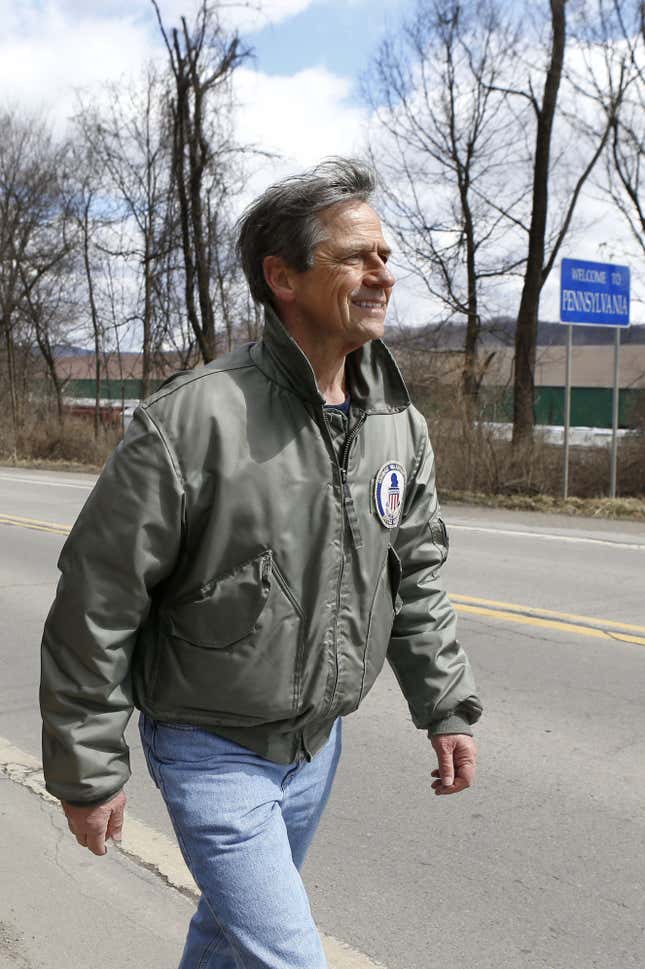
A retired Navy officer and former National Security Council director of defense policy under Bill Clinton, Sestak represented a deep-red district of Pennsylvania as a Democratic congressman between 2007 and 2011. He then ran unsuccessfully twice for Senator in Pennsylvania, and is now the president of First Global, a nonprofit focused on STEM education. “America’s retreat from the world today is so dangerous and damaging to our American Dream,” Sestak says in the 14-minute long video explaining his reasons for running as president. He also claimed Trump is “not the problem,” but a symptom of “a system that is not fair and accountable to the people,” and promises to fight corporate power and influence in DC. He is announcing his run later than other candidates because his daughter was successfully battling brain cancer. Sestak dropped out of the race on Dec. 1, 2019.
Age: 67 Years in politics: 4
Who gives him money: His 2010 campaign was primarily powered by individual contributions, small and large. Amongst the top contributors are the University of Pennsylvania, liberal advocacy group J Street, and law firm Blank Rome.
Biggest idea for the economy: Cut taxes for the middle class, raise corporate tax.
Social media following: Twitter: 10,800, Facebook: 17,000, Instagram: 326
Who will like this candidate: People worried about the US’s increasingly isolationist foreign policy, those who believe in bipartisanship.
Who will hate this candidate: People who think there is a limit to how many white men can run for president, or that Trump voters can be converted; those interested in shrinking the US’s role abroad.
Tom Steyer
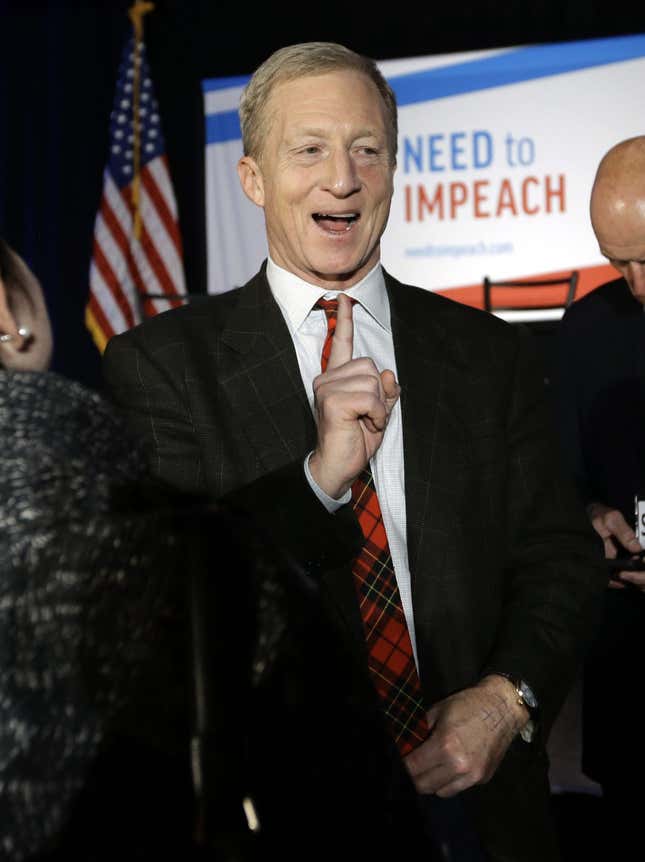
The billionaire Democratic mega-donor, who is pushing to impeach Trump, confirmed his intention to run for president on July 9. Steyer, who made his money building hedge fund Farallon Capital, has morphed into an environmental activist and philanthropist in recent years. The 62-year old donated more than any other American to political campaigns in 2016. He was expected to run for Senate in 2016 and governor of California in 2018, but did not enter those races. His platform is primarily concerned with fighting corporate influence on politics. Steyer announced his exit from the race on Feb. 29, 2020, shortly after the polls closed at the South Carolina primaries.
Age: 62 Years in politics: Steyer has been involved in politics since working on Walter Mondale’s presidential campaign in 1983, but never held or ran for office.
Who gives him money: No one. He gives people money.
Biggest idea for the economy: Steyer is likely to advocate for higher taxes for the wealthy, and a focus on economic growth through green jobs.
Social media following: Twitter: 237,000 Facebook: 505,000 Instagram: 41,500
Who will like this candidate: Voters frustrated with House Democrats foot-dragging on impeachment proceedings, some environmentalists.
Who will hate this candidate: Steyer has clashed with traditional Democratic party leadership, yet as a white man in his 60s he’s less likely to appeal to progressive voters.
Eric Swalwell
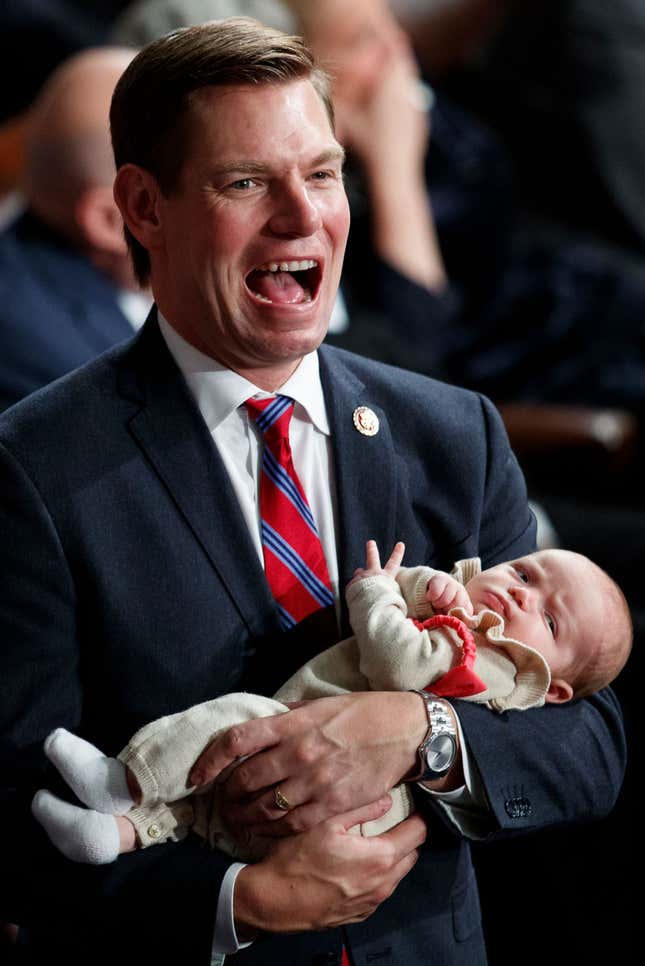
The three-term US representative for northern California launched his bid on the Steven Colbert’s Late Show on April 8, and dropped out on July 8. The son of a retired police officer and an administrative assistant, Swalwell touted his blue-collar roots, underscoring that he’s the first in his family to graduate from college and is still paying off his student debt. He made gun control his top priority, another issue likely to resonate with young voters. He beat a longtime, well-established incumbent to get to Congress as a political neophyte, but lack of experience and low national profile proved tough to overcome.
Age: 38 Years in politics: 9
Who gives him money: He says he’s not taking any corporate PAC money as a presidential candidate. In the past he took donations from a variety of industries, including finance and real estate, health, communications, and electronics.
Biggest idea for the economy: Expanding access to college by providing interest-free federal loans, allowing employers to make tax-free contributions to pay off their employees’ student debt and helping those in work-study programs graduate without owing anything.
Social media following: Twitter: 93,500, Facebook: 48,600, Instagram: 19,100.
Who will like this candidate: Voters who favor a bipartisan approach, including some moderate Republicans, millennials.
Who will hate this candidate: Democrats looking for more diverse leadership, those wanting a candidate with a hefty resume in running government and policy.
Marianne Williamson

The best-selling author of 12 books on spirituality, including Healing the Soul of America, she ran for US representative in California in 2014 as an independent. Williamson said she was thinking of running for president in November 2018. A spiritual advisor to Oprah Winfrey, she is an active supporter of the HIV/AIDS community, poverty reduction, and female empowerment. She is promoting racial reconciliation, reparations to the African-American community and a more humane US immigration policy. Williamson announced her withdrawal from the race on Jan. 10, saying she wouldn’t want to stand in the way of a progressive candidate winning the nomination.
Age: 66 Years in politics: 5
Who gives her money: Unclear so far; Williamson is independently wealthy.
Biggest idea for the economy: Pay $10 billion in slavery reparations every year for 10 years to the African American community.
Social media following: Twitter: 2.6 million, Facebook: 737,200, Instagram: 358,000.
Who will like this candidate: Some woke white liberals, coastal elites.
Who will hate this candidate: Pragmatic voters, nationalists, centrists, people who want the party to stay away from identity politics, those wary of modern spiritual movements.
__________________________________________________________________________________________________________________________________________
Andrew Yang
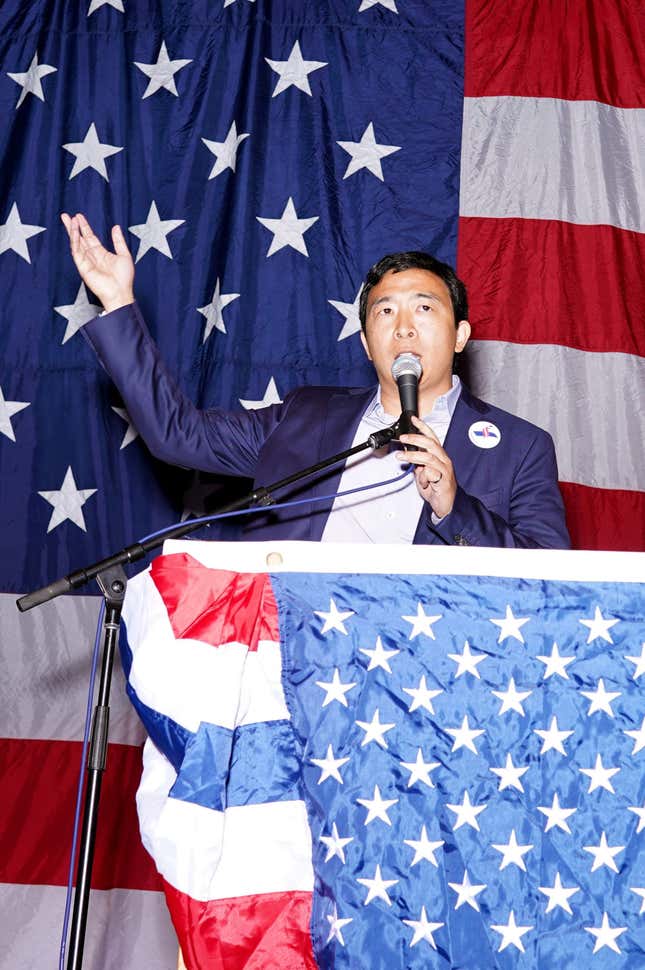
A former tech entrepreneur who started a nonprofit to promote startups, Yang entered the race Nov. 6, 2018 on essentially a single issue: protecting Americans from job-stealing robots. The son of Taiwanese immigrants, he sells himself as the opposite of Trump—an ego-free Asian man who likes math. He suspended his campaign on Feb. 11 in New Hampshire after a disappointing showing in the Iowa primaries.
“I am a numbers guy,” Yang told the Washington Post about his decision. “In most of these [upcoming] states, I’m not going to be at a threshold where I get delegates, which makes sticking around not necessarily helpful or productive in terms of furthering the goals of this campaign.”
Age: 44 Years in politics: Less than one
Who gives him money: Individual contributors, some who donate in bitcoin. He’s also using some of his own money.
Biggest idea for the economy: A $1,000 monthly check sent to every American over 18, so they can pay their bills as robots take over jobs.
Social media following: Twitter: 62,400, Facebook: 26,300, Instagram: 32,400.
Who will like this candidate: Silicon Valley types, promoters of universal basic income (UBI).
Who will hate this candidate: Anyone against higher taxes: Yang wants to fund his UBI proposal through value-added taxes.
Elizabeth Warren
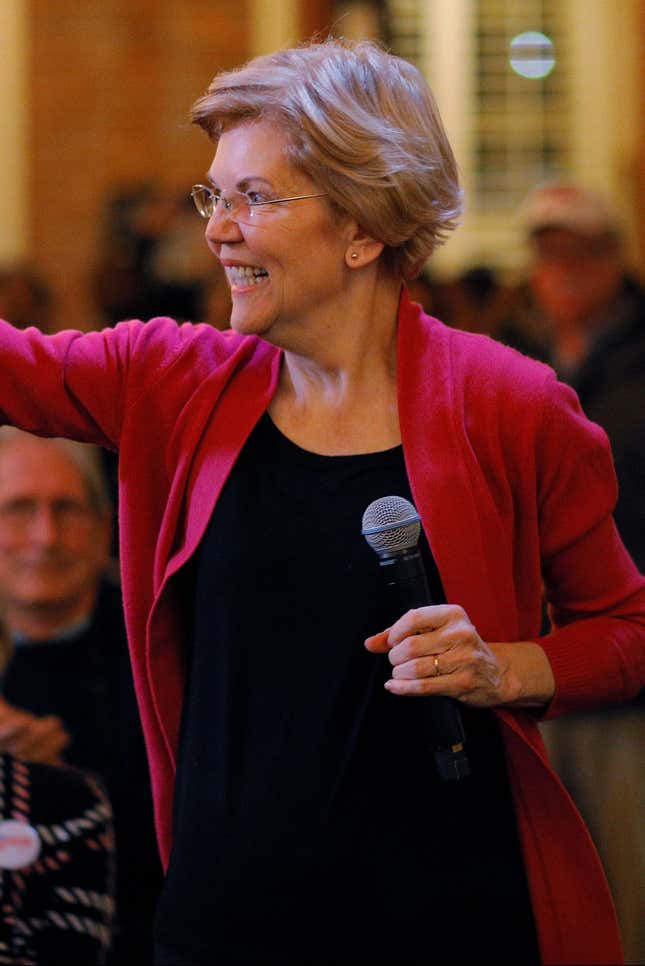
The former Harvard law professor became a household name as a US senator from Massachusetts when she spearheaded congressional oversight of the financial industry bailout. She’s promising to restore the US to a place where people can succeed if they “work hard and play by the rules” by holding billionaires and big corporations accountable. She formally entered the race Feb. 9, when she suggested Trump could be in jail by 2020. Despite good national polling, Warren could no longer see a path to nomination after Super Tuesday, and ended her presidential bid on Mar. 5, 2020.
Age: 69 Years in politics: 10
Who gives her money: The education industry, women’s PACs, and the legal profession in the past; she’s pledged to take no money from billionaires or billionaire PACS in 2020.
Biggest idea for the economy: A “wealth tax” of 2% on net worth over $50 million and 3% over $1 billion designed to raise $2.75 trillion over a decade.
Social media following: Twitter: 4.8 million, Facebook: 3.2 million, Instagram: 1.3 million.
Who will like this candidate: Detail-oriented voters who like her mix of east-coast academic know-how and midwest roots.
Who will hate this candidate: Voters who distrust the intellectual elite, people who doubt she has enough personal appeal and can lure centrists.
